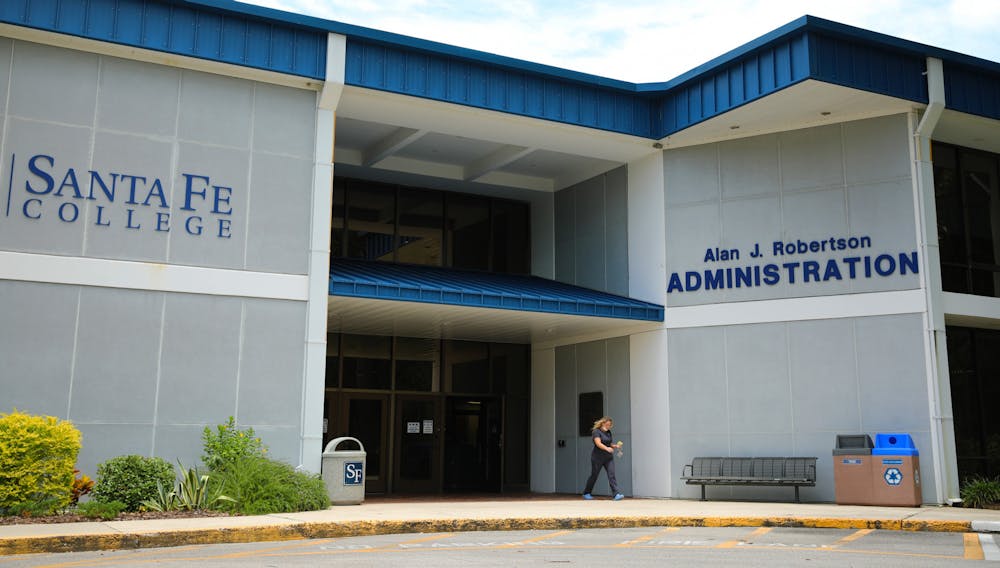In compliance with Gov. Ron DeSantis’ aspirations for state education, the Florida College System is evaluating curricula from all 28 state colleges for traces of “woke” ideology.
In a Jan. 18 joint statement released at a Florida State Board of Education meeting, the Florida College System presidents claimed college coursework emphasizing diversity, equity and inclusion have historically been embraced by the state. But the statement proceeded to urge colleges to reexamine coursework involving discussions of systemic racism by Feb. 1.
It’s not currently clear how curricula might be changed at each school based on the FCS statement. Neither SFC spokesperson Jay Anderson nor college President Paul Broadie II responded to multiple requests for comment via phone or email.
Landon Gonzalez, an 18-year-old SFC first-year sports management student, said although he believes race-related issues should be discussed in the classroom, his friend once felt singled-out during Black History Month discussions.
Gonzalez’s friend, a Black student at Valencia College, received school counseling to address how the lessons made him feel, he said.
“When he was reading about [Black History Month], it made him feel uncomfortable,” Gonzalez said. “He doesn't want to be defined by the past.”
Alan Beck, a SFC political science professor, said faculty and staff don’t yet know how the decision may impact classes.
“We've had a commitment to academic freedom,” Beck said. “And I plan to keep teaching the way I do without any changes.”
As a professor, Beck said his job is to teach realities — including the concepts of systemic racism, Jim Crow Laws and redlining in American history. Changing curricula might remove concepts students already struggle to comprehend, he said.
“My sense is that [students] don't have enough of an understanding of just how brutal Jim Crow was and just how oppressive it was,” Beck said.
The statement requested that “woke” ideologies and positions be removed from all 28 state colleges by Jan. 25. According to the Merriam-Webster Dictionary, “woke” refers to an acute awareness of societal issues, particularly topics involving race and social justice.
To many in the Florida Education System, it represents an existential danger that must be stamped out.
The FCS presidents said they support Gov. Ron DeSantis’ “vision of higher education, one free from indoctrination, an environment open to the pursuit of truth and the cultivation of intellectual autonomy for all students,” according to the Florida Department of Education’s Jan. 18 press release.
Madison Gumz, a 19-year-old SFC business and finance second-year student, said she’s already noticed nerves from professors when addressing controversial topics. She remembers her professor exercised extra caution when discussing politics in his lessons.
“He was very restricted in what he could say because it was government class,” Gumz said.
Although she doesn’t yet know how the FCS decision may impact SFC, Amanda Turner-Gibson, a 20-year-old SFC second-year sociology student, said she’s always received a thorough and diverse education from her professors.
“I've always felt like the professors I had did a really good job of keeping it unbiased,” Turner-Gibson said. “It was always, ‘this is what we’re learning, and this is what happened.’ I appreciate that.”
During a history lesson about the civil rights movement, Turner-Gibson decided to write an essay highlighting the importance of Black jazz artists. She said her presentation received mixed reviews, with some students viewing the project as divisive.
“I don't think you should choose white artists if we're trying to learn about civil rights,” Turner-Gibson said. “I just noticed the students in the classroom with me didn't feel like that.”
Understanding diverse perspectives and experiences through higher education will help her on her career path to becoming a therapist for adolescents struggling with substance abuse, she said.
“I would like to be able to learn all the different kinds of backgrounds,” Turner-Gibson said. “If I'm presented with a patient who I can't relate to, I can pull from something I've learned in school.”
Because students are entering college-level coursework, they should be able to handle adult conversations, Turner-Gibson said.
“It really comes down to an opinion at that point of what you think is controversial,”
she said. “For example, the topic of slavery — some might think it's too vulgar and they'll take it out. But that's something that everybody should learn about because it happened and it's important.”
The FCS decision is a part of a broad trend of manipulating higher education to prevent uncomfortable conversations, Turner-Gibson said.
“I don't see why we should change anything,” Turner-Gibson said. “We can't change the past, so why would we cover it up?”
Contact Sophia at sbailly@alligator.org. Follow her on Twitter @sophia_bailly.

Sophia is The Alligator's Fall 2025 digital managing editor. She previously served as the enterprise editor and university editor, as well as a beat reporter for three semesters. She has also interned for The Times-Picayune and The News & Observer as a politics reporter. Her non-journalistic passions include long-distance running, reading mystery books and listening to Florence + The Machine.






